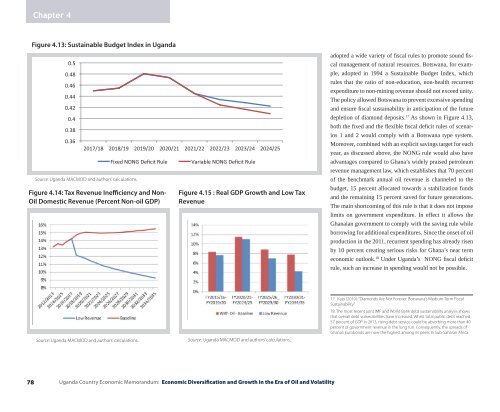Economic Diversification and Growth
71mK301zeG0
71mK301zeG0
You also want an ePaper? Increase the reach of your titles
YUMPU automatically turns print PDFs into web optimized ePapers that Google loves.
Chapter 4<br />
Figure 4.13: Sustainable Budget Index in Ug<strong>and</strong>a<br />
Source: Ug<strong>and</strong>a MACMOD <strong>and</strong> authors’ calculations.<br />
Figure 4.14: Tax Revenue Inefficiency <strong>and</strong> Non-<br />
Oil Domestic Revenue (Percent Non-oil GDP)<br />
Figure 4.15 : Real GDP <strong>Growth</strong> <strong>and</strong> low tax<br />
revenue<br />
adopted a wide variety of fiscal rules to promote sound fiscal<br />
management of natural resources. Botswana, for example,<br />
adopted in 1994 a Sustainable Budget Index, which<br />
rules that the ratio of non-education, non-health recurrent<br />
expenditure to non-mining revenue should not exceed unity.<br />
The policy allowed Botswana to prevent excessive spending<br />
<strong>and</strong> ensure fiscal sustainability in anticipation of the future<br />
depletion of diamond deposits. 17 As shown in Figure 4.13,<br />
both the fixed <strong>and</strong> the flexible fiscal deficit rules of scenarios<br />
1 <strong>and</strong> 2 would comply with a Botswana type system.<br />
Moreover, combined with an explicit savings target for each<br />
year, as discussed above, the NONG rule would also have<br />
advantages compared to Ghana’s widely praised petroleum<br />
revenue management law, which establishes that 70 percent<br />
of the benchmark annual oil revenue is channeled to the<br />
budget, 15 percent allocated towards a stabilization funds<br />
<strong>and</strong> the remaining 15 percent saved for future generations.<br />
The main shortcoming of this rule is that it does not impose<br />
limits on government expenditure. In effect it allows the<br />
Ghanaian government to comply with the saving rule while<br />
borrowing for additional expenditures. Since the onset of oil<br />
production in the 2011, recurrent spending has already risen<br />
by 10 percent creating serious risks for Ghana’s near term<br />
economic outlook. 18 Under Ug<strong>and</strong>a’s NONG fiscal deficit<br />
rule, such an increase in spending would not be possible.<br />
Source: Ug<strong>and</strong>a MACMOD <strong>and</strong> authors’ calculations.<br />
Source: Ug<strong>and</strong>a MACMOD <strong>and</strong> authors’ calculations.<br />
17. Kajo (2010): “Diamonds Are Not Forever: Botswana’s Medium-Term Fiscal<br />
Sustainability”.<br />
18. The most recent joint IMF <strong>and</strong> World Bank debt sustainability analysis shows<br />
that overall debt vulnerabilities have increased. Whilst total public debt reached<br />
57 percent of GDP in 2013, rising debt service could be absorbing more than 40<br />
percent of government revenue in the long run. Consequently, the spreads of<br />
Ghana’s Eurobonds are now the highest among its peers in Sub-Saharan Africa.<br />
78<br />
Ug<strong>and</strong>a Country <strong>Economic</strong> Memor<strong>and</strong>um: <strong>Economic</strong> <strong>Diversification</strong> <strong>and</strong> <strong>Growth</strong> in the Era of Oil <strong>and</strong> Volatility


